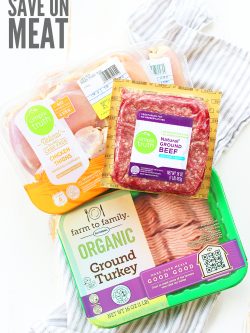Is your grocery spending out of control? Here’s how to make a grocery budget (and stick with it!). Figure out how much you should spend on groceries, plus my best strategies to save on food.

Several years ago my husband and I cut our monthly expenses in half. We set a monthly grocery budget of $330 for the two of us based on what we were spending.
And now that we’re a family of four, with a teen and a preteen, we are still able to maintain our grocery budget at around $400 per month.
I’ve learned over the years that guessing and assuming when it comes to the budget won’t work. Coming up with a number for a frugal grocery budget cannot be random. In fact, it must be strategic!
WHY MAKE A FRUGAL GROCERY BUDGET
The simple reason to create a frugal grocery budget is to save money. What you do with the money you save is entirely up to you!
- Our “one-day” dream was to buy a house with cash, and you know what? We did it!
- Maybe your dream is to pay for your kids’ college so they don’t have to take on student loans
- Or save up for a new-to-you car
- Or to build an emergency fund in case of unforeseen job loss
Whatever the reason, the biggest reason to make a frugal grocery budget is to spend less on food.
HOW TO MAKE A GROCERY BUDGET
MAKE A COMMITMENT TO REDUCING YOUR FOOD BUDGET
You absolutely cannot create a frugal grocery budget, or work within a budget if you’re dead set against it. It simply will not work.
- Mentally prepare yourself first. Commit to making a food budget – no if’s, and’s or but’s allowed. There will be a cap on your spending. If you reach the bottom of the money jar before the month is over, you’ll have to learn to make do with what you have.
- Take heart: eating well with only your pantry at hand is not an impossible task. We have gone 33 days without spending any money at all.
- The whole family needs to be on the same page with the grocery bill as well. Sit down with the family to explain why it’s important to have a grocery budget, and how it will allow you to achieve your greater money goals together.
- Explain how it will help you stop living paycheck to paycheck, and how to be more mindful when grocery shopping.
Soup nights, leftovers, and meat-less meals go over much easier when the family knows the reasoning behind them.

WHAT IS A REASONABLE FOOD BUDGET PER MONTH?
How much should I budget for groceries? I get this question A LOT. And honestly, there is no right answer!
Your food budget will be unique to YOUR family, life situation, dietary needs, and where YOU live, including the stores close to YOU and the types of food that YOU like to buy.
Coming up with our $400 grocery budget wasn’t some stroke of genius. We simply tallied up our average cost of groceries and said we wouldn’t go any higher.
This is just one way to create a budget though, and it might not be the best way for you to create one. Use the scenarios below or a grocery budget calculator as guidelines to help determine how much YOU should spend on food.
SCENARIO 1: GROCERY BUDGET BASED ON FOOD COSTS
Every month the United States Department of Agriculture (USDA) publishes a report with what they think the average cost of food is for families of various ages and sizes. They break it down into four plans: Thrifty Plan, Low-Cost Plan, Moderate-Cost Plan, and Liberal Plan.
Here’s a short summary of the average family of four.
If your family has less than or more than 4 people, or if you want to know specifics for ages and genders, the report gets pretty granular. Use the most recent report to get specifics for your family.
SCENARIO 2: PERCENTAGE OF SPENDING TO DETERMINE FOOD BUDGET
To find the percentage of the money you spend on food at home:
- (One Month Post-Tax Income) – (Grocery Spending in One Month)
- Divide by One Month’s Post-Tax Income
- Minus 1
- Multiply by 100 and ignore the negative sign
This will tell you what percentage of your monthly income you’re currently spending on food, and you can decide to increase or decrease your food budget from there.
SCENARIO 3: GROCERY BUDGET BASED ON YOUR INCOME
Of all the scenarios, this one is the most important because your food budget depends on how much money you make.
A friend once said that the food you buy does not determine your grocery budget and I couldn’t agree more.
If our grocery budget is based on the quality of food we buy, we have it backward. It’s entirely contradictory to the basic rules of budgeting!
It’s like saying because you want to buy a nice big new house, you need to have a bigger paycheck. But that’s not how it works. We start with the paycheck first, and THEN we see what kind of house we can afford.
The same goes for grocery budgeting…
We start with the money we have, and THEN see what quality of food we can afford.
If you don’t like that answer and want to be able to spend more money on quality food, then find ways to save money elsewhere and put more funds toward your food bill.

OTHER FACTORS TO CONSIDER WITH YOUR FOOD EXPENSES
Even when you think you have a general idea of how much you should spend on food, there are still other factors to consider:
- Allergies (i.e. dairy-free or gluten-free)
- Dietary restrictions (i.e. no pork, undergoing a healing diet like GAPS, or when you have sensitivities to specific foods)
- Whether or not you garden, can, or preserve
- The amount of processed food you eat vs. how much real food you eat
- How many stores you can easily access
- How much are you able to cook from scratch
- Growing kids and teenagers (and their friends)
- Hosting company (and whether or not that’s included in your food budget or a separate hospitality budget)
All of these will affect whether the grocery bill goes up or down.
Remember that how much you spend on food now is not set in stone forever. You can work really hard to get it as low as possible so you can save for a house, a new car, or boost your emergency fund. You might also have to increase your grocery budget as your family grows or the needs of your family change.
In any case, the starting point is knowing how much you have to spend on food!
HOW TO STICK TO YOUR FOOD BUDGET
Now that you have your food budget figured out, you need to stick to it! These strategies can help you keep your spending in check.
- Keep track of your spending. Continue to gather your receipts and note what you’re spending.
- Review your spending habits every week. Add up what you’ve spent so far for the month, and subtract that from your frugal grocery budget – will you make it to the end of the month based on what’s left?
- Hold yourself accountable. Keep your family in the loop. Together you can work towards sticking to your grocery budget, and you can celebrate when you do!
- Make a meal plan. Meal plans can make or break your grocery budget. Everything you buy should have a purpose, and by planning strategically, you can save on food and come in under budget. Just don’t forget to stick to the grocery list!
- Be willing to cook from scratch. You don’t necessarily have to make EVERYTHING from scratch but making SOMETHING from scratch in order to save a few dollars will go a long way. Start with this list.
- Postpone shopping by one day. This is a mental trick because most of us have enough food to get through one more day. Get creative – can you make it another day? How about another? You might be surprised how long you can put off a trip to the grocery store.
- Know when to cut corners. Little cheats like not adding shredded cheese on top of a dish, stretching ground beef with minced vegetables or lentils, or even making no-yeast bread instead of biscuits to save the butter can all add up to savings each month.
- Shop less often. Fewer trips to grocery stores mean fewer impulse buys.
- Check the clearance rack first. See if any of your usual buys are on sale, or if there’s something you can substitute for an item on your list.
- Eat from the pantry as often as possible. If you already have it in your house, you might as well eat it. And anything you’ve already paid for doesn’t add an expense to your current grocery budget.

LOWER YOUR GROCERY SPENDING
Beyond sticking to your grocery budget, you may also want to consider ways to save on groceries and lower your spending even more. This doesn’t happen overnight, so be prepared for the long haul.
There are many ways to reduce your grocery spending, like monthly meal planning with seasonal produce, cooking from scratch, buying in bulk, and using coupons and rebate apps (although I have chosen not to use coupons anymore). But here are some “out of the box” ways you can cut your spending:
- Categorize your spending. Do this according to the foods you bought and eliminate anything that didn’t fall into a major food group.
- Stop buying food when you’re doing other things. (i.e. a bag of popcorn while browsing Target, coffee from Starbucks while running errands)
- Conduct a pantry inventory. Include your fridge and freezer inventory. This is so you can see how much food you ALREADY have before you go shopping again.
- Avoid food waste. Wasting food is throwing away money. You can even avoid waste by using up food scraps.
- Stretch cuts of meat into more meals. Stretch chicken into 7 meals, a pork loin into 7 meals, and 2 pounds of ground beef into 8 meals!
- Cutting back on meat means you are eating more fruits and veggies. This, in turn, means you’re eating healthier!
- Keep your pantry stocked with real foods. Keeping real food on hand helps you have the ingredients you need to make a tasty meal. Then you’re not tempted to buy junk or eat out.
- Start a price book. Creating a simple price book can save a lot – HUNDREDS of dollars a year.
- Focus on reducing the cost of one food group. Start with coffee, cheese, milk, dairy, produce, or meat.
- Substitute expensive items for things that cost less. Making food substitutions is the first thing I have my Grocery Budget Bootcamp students do. Many save up to $100 the first week!

DO YOU NEED SOME HELP WITH YOUR GROCERY BUDGET TODAY?
There is no better time than right now, to start using the above strategies to create your frugal grocery budget! But if you need more help, I invite you to join the waitlist for my flagship course, Grocery Budget Bootcamp. Enrollment is currently closed, but you can join my FREE 5-day Crush Inflation Challenge and start saving money on groceries tomorrow!
- In this course, I teach my strategic system of making healthy food work within your budget, plus so much more!
- It’s very much like a college class, so enrollment is only open twice a year. You can either register for the course or join the wait list on this page.
- As of this writing, my students have collectively saved over $20 million dollars. THAT’S A LOT OF MONEY!
You can get your piece of the pie – just register for Grocery Budget Bootcamp, or sign up to be notified when enrollment is open!
MORE GROCERY BUDGETING TIPS
- How to Make a Meal Plan that Works
- How to Budget for Bulk Purchases
- The Secret to a Healthy Grocery Budget
- How to Save Money with a Pantry Challenge
- 5 Fail-Proof Ways to Reduce Grocery Spending
- Eating Real Food on a Budget






I live alone and I’m scared to even think about how much I spend on going out to eat in the city and ordering delivery (I can get pretty much anything I want delivered to my home — not just pizza and Chinese food. I’m talking Morton’s steaks, Cheesecake Factory, Thai, Ethiopian, etc.). I don’t really buy groceries, because sometimes it seems like a waste of money to cook for just one person, as many items can only be purchased in bunches, I’m too busy, and because I’m always eating out with friends and/or colleagues. However, these are basically excuses for me to avoid eating leftovers. I’ve given up alcohol which has saved me a lot of money, but I’ve still got work to do.
I’ve set a grocery budget of $400 for the coming month, which I recognize is quite high relative to the budgets I see above, but I don’t actually anticipate spending that much, and will lower the budget for the next month. I refuse to let food stand in the way of me paying off debt. 🙂
I love your last line Nikki – that’s how we feel about food and debt too!
Are you including supplements in your grocery budget or is that separate or don’t you take supplements? I have always taken supplements as part of the grocery budget. A lot of food even organic does not have the nutrition value that it did 20 years ago.
Allen – I take 3 supplements currently, collagen, maca and fish oil. These come out of a separate category, since they are more of a fixed budget item than not and we consider supplements more of a medical thing than food thing. But our supplement budget is relatively new – we didn’t use supplements until about 6 months ago.
Our key for saving money on groceries is buying in bulk. Especially things like toilet paper, shampoo, etc. When they go on sale at Costco, we’ll load up on six months to a years worth of them. That makes figuring out our budget a bit difficult since we buy things at varying frequencies. The key requirement is that you have to have enough storage space to take advantage of bulk buying.
These are some great grocery budgeting tips! Grocery expenses have been one of my biggest struggles in sticking to my budget. Once again thank you for the tips! I am definitely pinning and sharing!
-Rachel
We spend $400 a month on food only for 2 adults and 3 teen boys. We do foster care so the boys get free breakfast and lunch at school. There is always breakfast foods here but they would rather sleep!
We menu plan and eat or repurpose leftovers for dinner. I cook from scratch 95% of the time and we rarely go out to eat.
We have a soup and sandwich night and a breakfast for dinner night every week.
I have a price book and stock up on things when I can under a separate budget category that is allowed $25 per month. It works well for us!
Having a category for stock-up or monthly sale items sounds like a good idea. We are trying to switch from weekly trips to monthly. I don’t know if that will help decrease the total or not, but hubby wants to change. I have been tracking our spending for two months, and for the two of us, we spent $399 and $353. Some of that was stocking up on food that was on sale for really good deals, but we haven’t eaten yet. We could use a lot of those groceries without really stretching the budget. I just need to get into meal planning better.
I really like having a stock up category in my budget. Some months I use it all and sometimes a portion rolls over to the next month.
Some examples are butter at $1.68, asparagus at .99lb, and ground beef at $1.99 lb. Those items bought in bulk will serve us well for more than a month.
Wow!! I am impressed. WE are a family of 6, 3 of which are teenage boys. My cost is around $1000 when I am being good. My goal was to start trying to get it down to $750. I will see how that works and then go from there. I definitely have thingns that are pricy that I can cut. This blog and your post inspire me to put my head down and make it work.
No clue! $15, maybe
I’m just new to this page, so far i’ve loved what i’ve seen. I look forward to learning more from you.
Since 16 October, 2016 I came home from the grocery store and my cupboards were too full, so I told my Husband that I quit grocery shopping until we run out of food. He thinks i’m crazy but agreed as long as we were aloud to get fresh milk and eggs, the rest was fine. So we’ve bought eggs and milk for the past 3 months with a grocery budget around $15 per month. We try to cook supper every day, and i’m lucky he’s ok with meatless meals. Although where we live it is common to have meat stored in your freezer from the butcher, So we have 1/4 cow and 1/2 pig to go through before we have to go completely meatless.
I also grow much of my own veggies so I like to think we were not spending too much on food. we have plenty preserved (i’m going to try lactofermentation this year!).
I garden and this year i left my Kale and brussels sprouts growing, and harvested them until mid Dec. when we had our first deep freeze. (i’m also learning this year about winter gardening, these were completely unprotected, maybe if they were protected then i’d still be eating fresh Kale!) We haven’t had any truly fresh veggies at home since then. I’m starting to be anxious for spring growing season!
I do not know what I should make my goal. I think I need to go yearly based off the fact that we buy all of our beef and pork at one time. I would guess that for 2 we spend for meat 1000$ (700 1/4 cow, 300 1/2 pig). 200 on gardening… (seeds & Tools) hopefully will decrease once we are set up better.. but this year i’m hoping for a green house of some sort. 1200 on other foods from the grocery store, So yearly total 2400= 200/month
Where and how do you budget for things like toilet paper, paper towels, cleaning supplies, shampoo, conditioner etc. I’ve been doing a lot of research on budgets and it seems like when people talk about grocery budgets it’s just food. Where does the rest fit in?
You would create a separate line item for these items Lindsay. Personally, I budget once/quarter since not everything needs to be purchased once/month AND most things I buy to DIY cover more than one batch.
I tried to eliminate waste of for example paper towels, Kleenex and
washcloths by substituting rags
saved from clean old clothes. My
mother used to do this.
Barb from Quebec
That is a great tip, Barb!
We are a family of 4+2 teenager every 2 weekends. Our budget is about 570$. We live in Denmark were there is No cupons
Going from $1,000 to $400 is amazing, nicely done!
So nice to see what you all are doing. My husband and I have 5 children (ages: boy 8, girl 7, girl 4, girl 3, boy 1.5). So with a family of 7 we can see a low grocery spending of roughly $1100 and a high of $1400. I need/am committing to lowering this bill. A question I have for you is what should be the goal? You wrote in your 22 days to a fresh start worksheets, that Dave Ramsey says we should be spending only 5-15% of income on groceries, is that the goal for a family our size or a family of 4?
I am going to be very honest, and I hope no one judges me. Each year I recommit to having a good budget for groceries. I am able to do it sometimes, but right now I would say Yikes! We both work full-time, and are gone all day. My husband is gone about 12 hours. The kids and I are gone about 9-10 hours. Some nights when I know my husband will be late I take the kids out to eat. My grocery total for December is $908. That does not include any cash purchases or any eating out (and believe me, we ate out). About $150 of it is for local, pastured meat. I do try to get my meat that way; I buy much meat at the grocery store. I do love to cook, but it is hard after working all day. Also, my job requires a lot of at home work too. My family will eat breakfast for dinner, but soup is not the most popular thing. I do like this blog and have gotten some good ideas in the past. Looking for ideas to get organized, budgeted and healthy for 2017. I am off this week, so I can get started. We need lunches for work and school, so that includes cold cuts. Also, we do buy snacks. Not sure what else to do. Help.
That should read ” I don’t buy much meat at the grocery store”.
I give props to the working moms out there! I’m a “stay at home” mom of six and this is our first year of the kids attending school opposed to them being homeschooled. Wow, life is busy! The kids attending school has totally throw me for a loop. While homeschooling has its trials at least I was home to throw something in the oven for dinner. Lunches were much easier as they could fix them themselves, fry an egg or make a snacky plate. With three kids dairy, nut and gluten free school lunches are tough and expensive and 15 year old boys are hungry. I too need to reign in our grocery budget, get more organized and plan better. I have never kept track of what we spend, terrible I know. If I had to guess $1200 a month, that hurts to write. We carry no debt so we have it to spend but really eating up all our $$ is not a great plan 🙂 Here’s to 2017 and controlling the grocery budget.
We spend about $1300 per month for a family of 12, which includes 10 kids from 4-21 years old. We live in San Diego, where everything seems to cost more than almost everywhere else. We do buy a whole steer every other year, so that amount includes $200 per month that we set aside for the purchase of the steer. For us, the peace of mind knowing it is a safe supply of meat is worth the higher cost vs. grocery store meat. I prepare most meals, as going out to eat is quite expensive for a family of 12, but we do allocate approximately $200 per month for meals out. Additionally, the kids take lunches to school since buying school lunches would cost over $23 per day. Although our grocery budget sounds like a lot, we are feeding a small army! 🙂
Wow! I am impressed. Keep up the good work! Hello from Norway☺
Norway- Wow! This blog reaches far! 🙂 Thank you for your kindness and encouragement- I appreciate it! 🙂
Holy moly, $1300 isn’t that bad at all for 12 people!! We have easily spent $900 some months with a family of three in OC, just north of you in CA. I’ve been able to bring it down to $700, and the goal is $500/ for four people (expecting soon)
Well, our family is on the other end of the spectrum… We live in Colorado and spend about $900/ month for a family of six. Our kids are 2, 4, 6, and 8. I tend to buy packaged snacks for school lunches because they are convenient… But do cook most dinners from scratch. I buy organic meat and eggs, and my husband is not a fan of meatless meals… So that’s definitely an area we could trim if we got on the same page. Thanks for all the frugal living help!
We are a family of 3 and I spend $200 per month not counting dog food. We live in Tennessee. I cook from scratch and just started making my own breads! Thanks for the push in that area! We MUST EAT chemical free, preservative free due to a health condition that we can control with food to avoid taking a prescription. This made our budget go up just a little until I got a handle on the changes that I had to make. That led to cooking more from scratch than I already did! If it has more than 5 ingredients we don’t bring it in our house. I do use coupons for fruits and vegetables and watch the sales adds and use my crock pot a lot so I can buy the cheaper cuts of meat. We do meatless nights during the winter by having veg and potato soups. I also use the coupon apps and this year alone have saved over $700 just from the apps! Any month that I don’t use all the budgeted money and when I cash out the apps I put it in savings to stock up later when there is a mega sale. My goal next year (since we had our in-ground pool removed this summer) is to have a vegetable garden with some fruit bushes to help cut down even more on the food bill. Something else we do if we have a small amount of left over vegetables we put them in a bag or container and freeze them for veg soup later. I also do this when we have a roast and there is to much left over (even after making lunches) so I freeze it for beef stew of stroganoff later. We throw almost zero food away! (that was my goal for this year)
Thanks for sharing Rebecca. Throwing away zero food is also my goal. I plan to retire as soon as I can collect Medicare (January of 2019) and am searching for ways to save money wherever I can. Just bought a pressure cooker and canner to learn how to can.
Said a prayer that you reap lots from your garden.
I have my two daughters and myself, I spend about $100 a month on groceries, but I am very blessed that we have a discount food store in my town as well as a Lucky’s market. I between the two I can pick up most foods at less than half of what the big supermarkets charge. It takes a little longer to hit several stores to fill my shopping list but I definitely love being able to feed my kids healthy food AND be able to put the extra we would have spent in savings.
Thank you for the great tips, I really need to up my savings game with coupons and apps… maybe someday.
So glad you brought this topic up! I try to redo this process at the beginning of every year. Things change over time and so must my budget. We are a family of 5 (15 and 11 boys and 13 girl). We spend $550 per month. I have an intolerance for all grains and sugar and I have one that is dairy and gluten-free. We try to source from the cleanest places we can find but it’s getting harder to make ends meet in the grocery area. I think I’m getting lax on the snack area and relying more on store-bought gluten-free items. Time to refocus and make it work! I’m looking forward to seeing what your new e-course is all about!
Our grocery budget is $450 for two adults and we live in Maine. With eating out our total budget is $500 every month. We eat organic but I still think we could get this lower which is why I’m reading this blog 🙂 When I started using cash instead of the credit card (for points) I noticed a difference. I always thought the card was the best idea since I pay it off every month and get double points, but I actually buy less stuff when I’m handing over cash… Thanks for all the tips!
We spend $600/mo for my family of 4 for all meals, plus 3 adults for dinners only 5 nights per week (we live with my parents and adult sister). We live in southern California. We work to keep the food budget low and healthy by cooking from scratch, making my own staples when possible (thanks for the help there, Tiffany!), and shopping sales and using coupons when possible. We can afford some organics, but I don’t worry so much about that as focusing on real foods.
We spend $650 for a family of 5 (kids are 9,6,2). We are in georgia. My goal in the new year is not exactly to cut our budget but I would like to make sure we are getting the most bang for our buck. I stopped clipping coupons but don’t may attention to sales and stock ups as much as I should.
That’s a great goal Julie! Thank you for sharing!
We spent $200 a month for my husband and I and we are in NY. When we got married a year and a half ago we decided to drastically cut back on spending since he was going back to school full time and we wanted to pay off our debt. I was inspired by a lot of posts on Don’t Waste the Crumbs! We’ve successfully paid off over $60,000 of debt with only a few thousand to go. Then we plan on saving for having kids and buying a home! Thanks for the inspiration Tiffany!
Aw, you’re so welcome Caitlin! I’m glad I could help! 🙂
Caitlin, thats wonderful! I am interested in knowing how long it took you to pay off that amount of debt and also any additional tips you have on that! Asking for a friend 😉